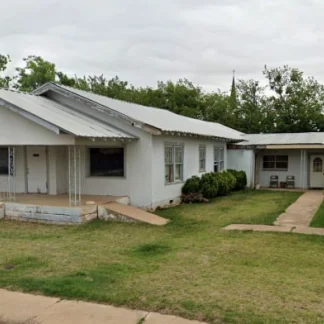West Texas VA Health Care System - Abilene CBOC
West Texas VA Health Care System - Abilene Community Based Outreach Clinic is a ...
Jubilee House of Abilene is a residential drug and alcohol rehab for adults in Abilene, Texas. They offer dual diagnosis care, inpatient and supportive housing programming, and dedicated services for young adults, adolescents, and LGBTQ+ persons. Their primary treatment modalities include addiction counseling and recovery-focused life skills training.
Jubilee House of Abilene is a long-term residential treatment facility for adults in addiction recovery in Abilene, Texas. They provide inpatient and supportive housing and aftercare planning and support. Specialized programming is available for adolescents, young adults, LGBTQ+ persons, and persons with co-occurring addiction and mental illness.
The inpatient program at Jubilee House of Abilene allows clients to focus on their recovery in a highly structured and supportive environment and residential setting. Clients engage in intensive individual, group, and family therapy. They also participate in rigorous, recovery-focused life skills training designed to support clients’ long-term sobriety and successful reintegration into their home, workplace, and community. Recovery education may include courses in self-care, wellness, nutrition, anger and stress management, trauma resolution, and relapse prevention. The supportive housing/sober living model also enables clients to cultivate independent living skills, including household and financial management.
Clients exiting the residential program at Jubilee House of Abilene receive comprehensive aftercare planning and support. Services may include peer coaching, vocational training and career counseling, 12 step program induction, and referrals for medical, mental health, and social service programs.
Jubilee House of Abilene accepts self-pay.
Contact us for more information: (325) 673-5522

Connect with Jubilee House of Abilene by calling their admissions team directly.
(325) 673-5522 Website Get DirectionsResearch clearly demonstrates that recovery is far more successful and sustainable when loved ones like family members participate in rehab and substance abuse treatment. Genetic factors may be at play when it comes to drug and alcohol addiction, as well as mental health issues. Family dynamics often play a critical role in addiction triggers, and if properly educated, family members can be a strong source of support when it comes to rehabilitation.
Group therapy is any therapeutic work that happens in a group (not one-on-one). There are a number of different group therapy modalities, including support groups, experiential therapy, psycho-education, and more. Group therapy involves treatment as well as processing interaction between group members.
In individual therapy, a patient meets one-on-one with a trained psychologist or counselor. Therapy is a pivotal part of effective substance abuse treatment, as it often covers root causes of addiction, including challenges faced by the patient in their social, family, and work/school life.
Group therapy is any therapeutic work that happens in a group (not one-on-one). There are a number of different group therapy modalities, including support groups, experiential therapy, psycho-education, and more. Group therapy involves treatment as well as processing interaction between group members.
In individual therapy, a patient meets one-on-one with a trained psychologist or counselor. Therapy is a pivotal part of effective substance abuse treatment, as it often covers root causes of addiction, including challenges faced by the patient in their social, family, and work/school life.
In individual therapy, a patient meets one-on-one with a trained psychologist or counselor. Therapy is a pivotal part of effective substance abuse treatment, as it often covers root causes of addiction, including challenges faced by the patient in their social, family, and work/school life.
West Texas VA Health Care System - Abilene Community Based Outreach Clinic is a ...
Serenity House in Abilene, Texas, offers comprehensive addiction recovery servic...
Brian Hudspeth Counseling is a private rehab located in Abilene, Texas. Brian Hu...
Advanced Therapy is a private rehab located in Abilene, Texas. Advanced Therapy ...